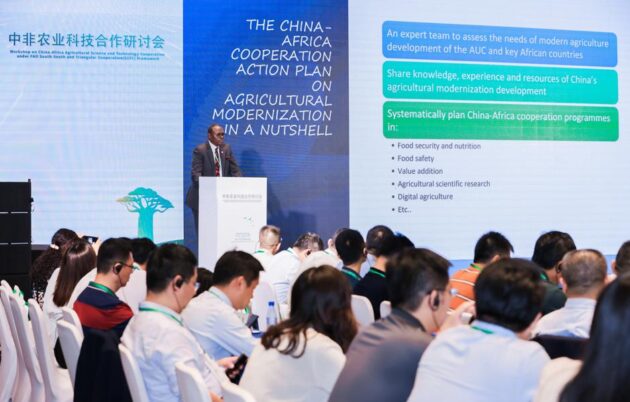
China and Africa forge agricultural tech cooperation for growth
The agricultural science and technology cooperation between China and Africa is steadily gaining momentum, fueled by great possibilities for mutual benefits, said participants of an event held in Sanya, South China’s Hainan province.
Wednesday’s workshop on China-Africa Agricultural Science and Technology Cooperation under FAO South-South and Triangular Cooperation Framework aims to bolster agricultural technology cooperation between China and African countries and facilitate the modernization of agriculture across Africa.
“Science and technology play a fundamental role in transforming agriculture and enhancing food security. With its vast innovation potential, Africa can benefit from adopting advanced agricultural technologies,” said Sun Tan, vice president of the Chinese Academy of Agricultural Sciences (CAAS).
He added that China’s technological advancements and experiences can be references for African countries seeking to improve agricultural productivity and sustainability.
So far, CAAS has established cooperation with 23 African countries and nine international organizations. It has distributed more than 1,000 green super rice materials to nine African countries, and the cumulative promotion area has reached 57,000 hectares, exceeding the productivity of local varieties by over 20 percent.
As one of the leading institutions in educating African students in the agricultural sector, CAAS has trained 276 students from African countries. It plans to enroll African students at the National Nanfan Breeding Research Center, specifically focusing on training them for scientific and technological innovation in the seed industry. Sun said that the plan aims to double the number of international students, particularly from Africa, within the next five years.
Felix Dapare Dakora, former president of the African Academy of Sciences and a foreign academician of the Chinese Academy of Engineering, noted that China faced food challenges in the 1950s and 60s, but the country managed to overcome them with just 9 percent of its agricultural land, which was responsible for producing about 20 percent of the global food supply.
“Rather than looking to other regions with different contexts, it would be more beneficial for African nations to glean insights and experience from China’s journey, given the shared historical challenges and the success China has achieved,” he suggested.
Dakora believes seed breeding in Hainan will be crucial in facilitating the exchange of high-quality seeds between China and Africa.
The academician sees the tropical province as a key player in sharing its expertise and resources with the world’s tropical regions, including Africa. He envisions the Hainan Free Trade Port as a vital link connecting with Ghana’s African Continental Free Trade Area. This connection holds the potential for fostering exchanges of biological materials and enhancing food security measures between China and Africa.
Takele Weldu Gebrewahid, a post-doctoral researcher from Ethiopia, now works in the big data intelligent design breeding innovation engineering team at the CAAS. He said that his home country has yet to harness the potential of smart technology in agriculture. Eager to bridge this gap, he aspires to acquire knowledge and skills to utilize these cutting-edge approaches to benefit Ethiopia.
For more visit China Daily
For subscriptions on news from China Daily, or inquiries, please contact China Daily Africa Ltd on +254 733 566 499 or write to enquiries@chinadailyafrica.com
